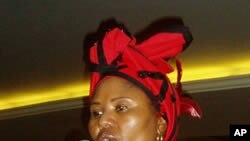A team of South African mediators continued efforts Tuesday to calm the political strife in Harare where communications within the power sharing government have broken down and two of the three governing parties are talking elections in 2011.
President Robert Mugabe and Prime Minister Morgan Tsvangirai are barely on speaking terms and the Senate has been adjourned to February 2011 following disruption of the upper chamber by senators of Mr. Tsvangirai's Movement for Democratic Change wing protesting allegedly unilateral gubernatorial appointments by Mr. Mugabe.
The South African facilitation team led by Zuma advisor Lindiwe Zulu held separate meetings with President Mugabe and Prime Minister Tsvangirai on Monday, and met on Tuesday with Deputy Prime Minister Arthur Mutambara, head of a rival MDC formation.
Mutambara has declared that the country is not ready for elections next year, accusing his fellow unity government principals of "grandstanding" with their ballot calls.
MDC sources said Mr. Tsvangirai demanded a road-map to elections and an end to the steadily rising political intimidation and outright violence, especially in rural areas.
Mr. Tsvangirai also demanded that Mr. Mugabe's appointments of provincial governors, ambassadors and judges, which his party says were made without consultation under the Global Political Agreement for power sharing, be reversed.
But the presence of the Zuma team not prevent the protagonists from trading barbs.
Mr. Tsvangirai's MDC criticized Vice President John Nkomo in a statement Tuesday for saying in an interview quoted by the state-controlled Herald newspaper that his ZANU-PF party made a mistake by entering the national unity government.
Nkomo said ZANU-PF entered the unity government "because we thought it was the best way forward, but obviously we were mistaken.” He added that “we cannot keep on dining with the enemy... We are strange bed fellows and the earlier we separate the better."
The MDC statement urged the vice president to "zip his mouth." It said such statements are "tantamount to creating divisions in a nation that is nursing bruises inflicted by ZANU-PF functionaries during a reign of terror that sought to silence any dissenting voice following their landslide defeat to MDC in 2008."
It said Nkomo was a "purveyor of acrimony" rather than "an agent of national healing," a reference to his position as a co-chairman of the Organ on National Healing.
ZANU-PF sources for their part said Mr. Mugabe told the South African envoys that the impasse in the unity government could only solved by an early election. In principle the term of the unity government ends in two years, or February 2009, though its leaders could agree to extend it as the Southern African Development Community urges.
Mr. Mugabe’s position was echoed by Justice Minister Patrick Chinamasa, who said the MDC disruption of the Senate amounted to a call for early elections, and that ZANU-PF intended to organize elections even earlier than mid-2011 as Mr. Mugabe envisioned.
But Deputy Justice Minister Obert Gutu of the Tsvangirai MDC formation, commented in an interview with reporter Blessing Zulu that Chinamasa was misguided.
ZANU-PF spokesman Rugare Gumbo also contradicted Chinamasa, saying the party will not rush into an early election.
Lovemore Madhuku, chairman of the National Constitutional Assembly, a civic group, said the South African mediation was an exercise in futility.





